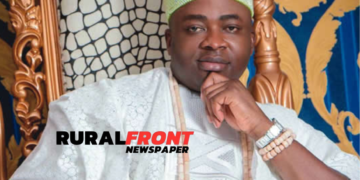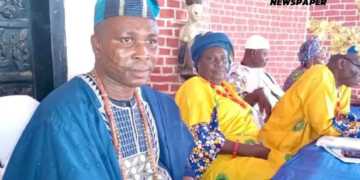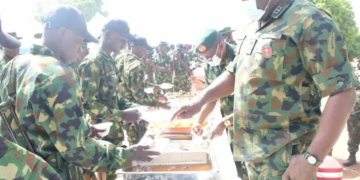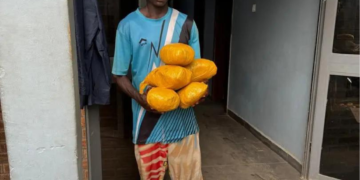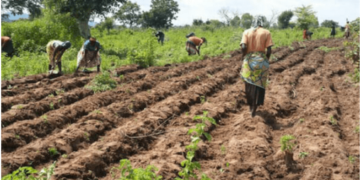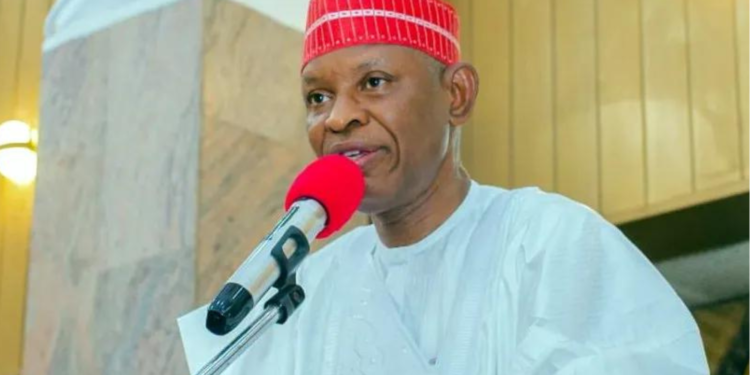The State’s Commissioner of Information, Halilu Dantiye disclosed this while briefing newsmen on outcome of the State Executive Council meeting chaired by Governor Abba Yusuf.
Dantiye said the sum was for renovation of the defective wall or fence and surroundings at Nassarawa Emir’s Palace.
Recall that the government had ordered the Commissioner of Police to evict the 15th Emir, Bayero from the palace where he is trespassing on government property and for onward demolition and renovation.
The sum was out of the N8.6 billion total sum earmarked for various projects around health, education, water supply and agriculture among others expected to be executed across the state.
“Revocation and Re-award of contract for the construction of Post Midwifery Institute at Gezawa Local Government Area at the sum of N770,858,450.39, Reconstruction and Renovation of Defective Wall/Fence and Surroundings at Nassarawa Emir’s Palace at the sum of N99,928,541.63 and Rehabilitation of water supply infrastructure at government house at the sum of N126,987,787.
“Release of funds for the procurement of essentials drugs and welcome packs for newborns, free maternal, neonatal, child health and free accidental and emergency commodity for January to March, 2024 at the sum of N165,000,000, Repair of 18km old water pipeline at Dambatta LGA and its Environs at the sum of N129,636,102 and Construction of 138 No. new hand pump boreholes under the second phase of PEWASH programme State Matching Project at some local government areas at the sum of N193,000,000.
“Revocation and Re-award of contract for the completion of the construction of college of Nursing and Midwifery at Madobi local government area at the sum of N57,066,422.52, Payment for the excess workload allowances to the two state owned universities ADUDT and YUMDUK at the sum of N447,621,640.79, Construction of Magistrate courts complex at the premises of Gidan Murtala at the sum of N259,143,824.08 and the procurement of fertilizer by the 44 Local Government Councillors to enhance food security and agricultural productivity during the 2024 raining season at the cost of N5,073,840,000.
“Others include, Renovation & Upgrading of D-ward for the establishment of sickle cell unit at Murtala Muhd Specialist Hospital, Kano at the sum of N81,621,546.76, Construction/Renovation works at Infectious Diseases Hospital to accommodate the new Kano State Centre for Diseases Control at the sum of N64,825,000.83 and 25- Reconstruction/Conversion of Gidan Murtala ground floor to accommodate a new ministry at the sum of N196,853,158.99 among others to the total of N8,629,636,749.49 Billion.
“These projects aim to enhance the state’s infrastructure, healthcare, education, and security,” the approvals by the State Executive Council reads.
Meanwhile, a Kano based group known as War Against Injustice, WAI has described the allocation as misallocation of resources and unacceptable.
The group’s Executive Director, Comrade Umar Ibrahim said government should place priority on welfare of the common man and not the interests of the elite while calling on the government to redirect the funds towards projects that will benefit the majority of the population.
“We are appalled by the Kano State Executive Council’s decision to approve the reconstruction and renovation of the Nassarawa Emir’s Palace at a staggering cost of 99,928,541.63.
“This gross misallocation of resources is unacceptable when primary schools and healthcare facilities in Kano State are in a state of disrepair.
“The government’s priority should be the welfare of the common people, not the interests of the elite. We demand that the government reconsider this decision and redirect these funds towards projects that benefit the majority of the population,” Comrade Ibrahim however stated.
The controversy surrounding the Kano Emirate tussle has been a topic of heated debate among the residents of Kano State. The decision to allocate such a significant amount of money for the renovation of the Nassarawa mini palace has sparked outrage and criticism from various quarters. Many believe that the funds could be better utilized to address the pressing needs of the common people, such as improving healthcare facilities, upgrading educational institutions, and enhancing water supply infrastructure.
The Kano State government, however, maintains that the renovation of the Nassarawa mini palace is necessary to preserve the cultural heritage and historical significance of the Emirate. The palace, which has been home to the 15th Emir of Kano, Aminu Ado Bayero, is considered an important symbol of the state’s rich history and tradition. The government argues that the renovation will not only restore the palace to its former glory but also attract tourists and boost the local economy.
Despite these justifications, the allocation of N99.9 million for the renovation has been met with skepticism and opposition. Critics argue that the government should prioritize the welfare of the common people over the interests of the elite. They point out that many primary schools in the state are in dire need of repair, with dilapidated buildings and inadequate facilities hindering the education of young children. Similarly, healthcare facilities in Kano State are struggling to provide quality care due to a lack of resources and outdated infrastructure.
The War Against Injustice (WAI) group has been particularly vocal in its criticism of the government’s decision. The group’s Executive Director, Comrade Umar Ibrahim, has called on the government to redirect the funds towards projects that will benefit the majority of the population. He argues that the welfare of the common people should be the government’s top priority, and that the allocation of such a large sum for the renovation of the Nassarawa mini palace is a clear indication of misplaced priorities.
In response to the criticism, the Kano State government has reiterated its commitment to improving the lives of its citizens. The State’s Commissioner of Information, Halilu Dantiye, has emphasized that the N99.9 million allocated for the renovation of the Nassarawa mini palace is just a small fraction of the total N8.6 billion earmarked for various projects across the state. He points out that the government has also allocated significant funds for healthcare, education, water supply, and agriculture, among other sectors.
For instance, the government has approved the revocation and re-award of the contract for the construction of the Post Midwifery Institute at Gezawa Local Government Area at a cost of N770,858,450.39. Additionally, funds have been released for the procurement of essential drugs and welcome packs for newborns, free maternal, neonatal, and child health services, as well as free accidental and emergency commodities for the first quarter of 2024, amounting to N165,000,000.
Furthermore, the government has allocated N129,636,102 for the repair of an 18km old water pipeline at Dambatta LGA and its environs, and N193,000,000 for the construction of 138 new hand pump boreholes under the second phase of the PEWASH programme State Matching Project in various local government areas. These projects are aimed at improving water supply and sanitation in the state, which are critical for the health and well-being of the residents.
In the education sector, the government has approved the revocation and re-award of the contract for the completion of the construction of the College of Nursing and Midwifery at Madobi Local Government Area at a cost of N57,066,422.52. Additionally, the government has allocated N447,621,640.79 for the payment of excess workload allowances to the two state-owned universities, ADUDT and YUMDUK.
The government has also prioritized the construction of new infrastructure to enhance the state’s judicial system. A sum of N259,143,824.08 has been allocated for the construction of a Magistrate courts complex at the premises of Gidan Murtala. This project is expected to improve the efficiency and accessibility of the judicial system, ensuring that justice is served promptly and fairly.
In the agricultural sector, the government has allocated N5,073,840,000 for the procurement of fertilizer by the 44 Local Government Councillors. This initiative is aimed at enhancing food security and agricultural productivity during the 2024 rainy season. The government believes that by supporting farmers with the necessary resources, it can boost agricultural output and improve the livelihoods of the rural population.
Other notable projects include the renovation and upgrading of D-ward for the establishment of a sickle cell unit at Murtala Muhd Specialist Hospital, Kano, at a cost of N81,621,546.76. The government has also approved construction and renovation works at the Infectious Diseases Hospital to accommodate the new Kano State Centre for Diseases Control at a cost of N64,825,000.83. Additionally, the reconstruction and conversion of Gidan Murtala ground floor to accommodate a new ministry has been approved at a cost of N196,853,158.99.
These projects, according to the Kano State government, are part of a comprehensive plan to enhance the state’s infrastructure, healthcare, education, and security. The government believes that by investing in these critical sectors, it can improve the quality of life for its citizens and promote sustainable development.
However, the War Against Injustice (WAI) group remains unconvinced. Comrade Umar Ibrahim has reiterated his call for the government to reconsider its decision and redirect the funds allocated for the renovation of the Nassarawa mini palace towards projects that will benefit the majority of the population. He argues that the government’s priorities are misplaced and that the welfare of the common people should be the primary focus.
The controversy surrounding the Kano Emirate tussle and the allocation of funds for the renovation of the Nassarawa mini palace is likely to continue. As the debate rages on, it is clear that the Kano State government faces a challenging task in balancing the interests of preserving cultural heritage with the pressing needs of its citizens. The outcome of this controversy will undoubtedly have significant implications for the future of the state and its people.





